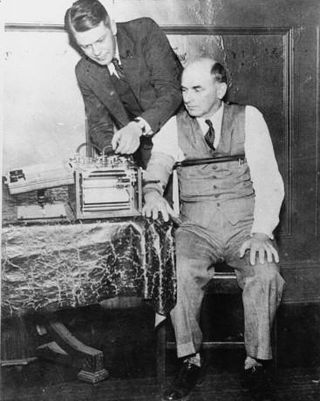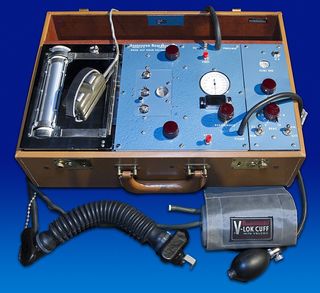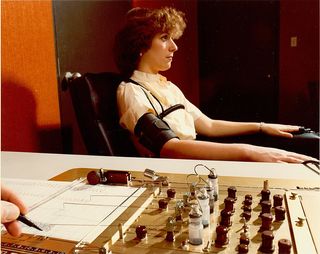Do Lie Detector Tests Really Work? - Psychology Today
Do Lie Detector Tests Really Work? - Psychology Today |
| Do Lie Detector Tests Really Work? - Psychology Today Posted: 14 Jan 2020 12:00 AM PST In February of 1994, the FBI arrested Aldrich Ames, who had been a CIA employee for 31 years. Ames was arrested and charged with espionage. He was a Russian spy. For nine years, he had been passing secrets to the Russians in exchange for over $1.3 million. His spying activities had compromised dozens of CIA and FBI operations. Worse yet, his treacherous crimes had led to the deaths of several CIA spies and the imprisonment of many more. During the time that Aldrich Ames was operating as a Russian spy, the CIA had twice given him a lie detector test. Despite having no special training in how to defeat a lie detector test, Aldrich passed both times.  Source: wikimedia The modern polygraph, better known as the "lie detector test," is a fascinating little instrument with a long and controversial history. The earliest version a polygraph instrument was developed in 1921 when John Larson cobbled together previously developed measures of respiration, heart rate, and blood pressure that had individually shown promise as a measure of lying. Technological developments continued, and the modern polygraph is now an integrated, state-of-the-art, computerized system that continuously monitors blood pressure, heart rate, respiration, and perspiration. The theory behind the polygraph is that when people are lying, they experience a different emotional state than when they are telling the truth. Specifically, it is thought that when people are lying, especially in high stakes scenarios such as police interrogations, they are anxious or afraid of being caught in a lie. When guilty people are asked questions that would reveal their guilt (e.g., Where were you last Tuesday?), and they lie, the fear of being detected causes increased activation of their sympathetic nervous system. This activation leads to an increase in heart rate, blood pressure, respiration, and perspiration. These changes are part of the fight-or-flight system that initiates whenever was are scared. You have probably felt your heart pounding or your palms sweating when faced with danger, be it a vicious dog, an angry boss, or an upcoming exam.  Source: wikimedia The polygraph is designed to detect those subtle changes in a person's physiological responses when they lie. The general idea is that when a person is being honest, their physiological responses remain stable under questioning, whereas a guilty person's heart will race. One of the most common polygraph procedures is called the comparison question test (also called the control question test). The examinee is asked relatively benign questions such as "Where do you live." They are also asked questions that are not relevant to the crime, but which would likely trigger an emotional reaction such as, "Have you ever told a lie?" They are then asked questions about the alleged crime such as, "Did you steal the documents?" The premise of the comparison question test is that a guilty person will have a much stronger physiological reaction to the crime question, whereas an innocent person will not. The polygraph is used in criminal investigations, although it is generally not admissible as evidence in a trial. It is also used as a pre-employment and continuing employment screening tool for many federal employees who work in sensitive positions, such as CIA agents and FBI agents. Private businesses, however, cannot force their employees to submit to a polygraph test. So, does the polygraph actually work? Are the results accurate? It does work much of the time. Typically, when someone is lying, a well-trained polygraph examiner can tell. It is not 100% accurate though. The American Polygraph Association is the world's leading association dedicated to the use of evidence-based scientific methods for credibility assessment. It is an organization whose members are largely polygraph examiners. They estimate the accuracy of the polygraph to be 87%. That is, in 87 out of 100 cases, the polygraph can accurately determine if someone is lying or telling the truth. That sounds pretty impressive, but it is important to keep in mind that the polygraph is failing 13% of the time. The federal government sought an unbiased evaluation of the polygraph, so they tasked the National Academy of Sciences with a full investigation of the polygraph's accuracy. In 2003, this large team of notable scientists came to the conclusion that the polygraph was far less accurate than the polygraph examiners had claimed. Some scientists have claimed that the accuracy may be closer to 75%. This lackluster performance is the reason why polygraphs are not used as evidence in criminal trials. They just cannot be trusted.  Source: wikimedia For more clear evidence that the polygraph is unreliable, just look back to the Alrich Ames case mentioned at the top of this article. Ames lied during his polygraph examinations at the CIA, and he passed each time. In this case, the lie detector test failed. When asked how he passed the polygraph test, Ames said that he followed the advice of his Russian handlers. They told him, "Just relax, don't worry, you have nothing to fear." The Russians knew that the polygraph was flawed. They knew that it was only accurate if the examinee was worried and anxious. They knew that if Ames could just relax, he would pass. |
| Lie-detector tests planned for convicted terrorists freed on licence - The Guardian Posted: 20 Jan 2020 12:00 AM PST  Convicted terrorists will face lie-detector tests under a raft of measures drawn up in the wake of the most recent London Bridge attack to toughen up the monitoring of offenders in the community. The number of counter-terrorism specialist probation officers will double and they will work to a set of updated national standards for managing terrorists on licence, with closer monitoring and reporting requirements including polygraph tests, the Home Office and Ministry of Justice said in a joint announcement. Polygraphs, commonly known as lie-detector tests, remain inadmissible in UK courts but their use within the probation service for monitoring offenders is increasing. Sex offenders and domestic abuse perpetrators are already subject to the technology, and failures to pass a test can lead to further investigation or supervision. The government is to launch an independent review of the way different agencies including the police, the probation service and the security services investigate, monitor and manage terrorist offenders – a process known as Multi Agency Public Protection Arrangements (Mappa). The review will be led by Jonathan Hall QC, the independent reviewer of terrorism legislation. Usman Khan, a convicted terrorist who was out on licence when he murdered two people in Fishmongers' Hall, in central London, last month before trying to flee across London Bridge where he was shot dead, was subject to Mappa for his previous offending. The atrocity, which happened in the midst of the general election campaign, led to renewed debate over the impact of austerity on the probation service, which has been crippled by cuts to budgets and staff numbers over the past decade. A counter-terrorism bill to be unveiled within the first 100 days of the new government will end automatic release on licence for terrorist offenders who receive extended determinate sentences and will introduce a mandatory minimum of 14 years in prison for those convicted of preparing acts of terrorism or directing a terrorist organisation. Khan's attack triggered calls for an overhaul of sentencing regimes for terrorist offenders. The father of Jack Merritt, one of the two people killed, accused politicians of capitalising on his son's death. The government will also increase the number of specialist psychologists and specially trained imams in prisons and probation who assess the risk of radicalised offenders. Counter-terrorism policing will increase by £90m to £906m in 2020-21, the Home Office announced, while the Victims of Terrorism Unit will receive an additional £500,000 in funding. Critics said the overhaul was too little, too late. The shadow home secretary, Diane Abbott, said: "After 10 years in government, a major overhaul now is actually an admission of failure. Major terrorist outrages have occurred all too frequently, including attacks by perpetrators who were known to the security services. "The fight against terrorism has been undermined by cuts to policing, including community policing, a lack of effective coordination between police and security services as well as the flawed Prevent programme. All of these need to change if we are going to improve the safety of our citizens." Khan is understood to have been cooperating with the probation service, which is why he was allowed to travel to London to attend the rehabilitation event at which he launched his frenzied attack. The chief inspector of probation alluded last week to a lack of "professional curiosity" among inexperienced probation officers who were unable to spot signs of "false compliance" – an industry term for offenders who cooperate with their licence terms in an attempt to conceal their true intentions. Last year the Ministry of Justice launched a three-year pilot of mandatory polygraph tests on domestic abuse perpetrators released on licence. Lie-detector tests on serious sex offenders on parole in England and Wales have been happening since 2007, and since 2014 mandatory tests have been added to some offenders's release conditions. |
| You are subscribed to email updates from "how does a polygraph work" - Google News. To stop receiving these emails, you may unsubscribe now. | Email delivery powered by Google |
| Google, 1600 Amphitheatre Parkway, Mountain View, CA 94043, United States | |
Comments
Post a Comment